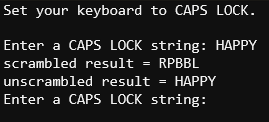At the end of the Cybersecurity: Encryption Intro tutorial, there’s a Your Turn in the Substitution Ciphers page where you created a scrambled_alphabet_cipher script. This kind of function is a much better defense against brute force attacks. Instead of testing 93 possible shifts, a brute force attack would have to try decrypting with 26! permutations of the alphabet. The term 26! is pronounced 26 factorial.
3! = 3 * 2 * 1 = 6
4! = 4 * 3 * 2 * 1 = 24
5! = 5 * 4 * 3 * 2 * 1 = 120
…
26! = 403,291,461,126,605,635,584,000,000
Wow! That would be a lot of rearrangements of the alphabet for a brute force algorithm to crack. Also, who would try to look at all those combinations to find the intelligible text?
Example script: scrambled_alphabet_cipher
- Enter, name, save, and flash scrambled_alphabet_cipher into a micro:bit.
# scrambled_alphabet_cipher
from microbit import *
# Scrambled alphabet cipher.
def scramble(text, encrypt):
alpha = "ABCDEFGHIJKLMNOPQRSTUVWXYZ"
crypta = "PTQGMKCRSVEXADZBJFOWYNIHLU"
result = ""
if encrypt is False:
temp = alpha
alpha = crypta
crypta = temp
for letter in text:
letter = letter.upper()
index = alpha.find(letter)
result = result + crypta[index]
return result
# The script starts executing statements from here.
sleep(1000)
print("Set your keyboard to CAPS LOCK.")
print()
while True:
text = input("Enter a CAPS LOCK string: ")
result = scramble(text, True)
print("scrambled result =", result)
result = scramble(result, False)
print("unscrambled result =", result)
- If the serial monitor isn't already open, click the Show serial.
- Either press CAPS LOCK, or hold the SHIFT key as you type.
- Type HAPPY into the terminal.
- Verify that the scrambled result is RPBBL. That’s the encrypted result.
- Verify that the unscrambled, decrypted result is HAPPY.

